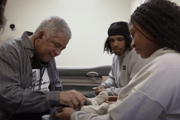Bloated, gassy, and over 60? These 11 surprising triggers might be why—and what you can do about it
- Replies 0
Let’s get real—feeling gassy isn’t just a minor annoyance.
When your stomach sounds like a brass section and your waistband starts fighting back, you want answers.
If you’re over 60 and noticing more air traffic in your belly than usual, it’s not just in your head.
While the occasional toot is totally normal (10 to 12 times a day), persistent bloating or sudden spikes in gassiness can be your body’s way of raising a red flag.
So what’s really behind the bloat? Some of the usual suspects—beans, cabbage, and carbonated drinks—might already be on your radar. But experts say there’s a whole lineup of less obvious culprits you might be overlooking.
Here are 11 sneaky causes of excess gas—and what you can do to take control.

1. Your sleep routine is out of sync
Think your gut doesn’t care when you go to bed? Think again. Your digestive system has its own internal clock, and when your sleep is erratic, it throws everything off—especially your gut bacteria.
This imbalance (a.k.a. dysbiosis) can lead to excess gas production.
Solution? Keep a steady bedtime and aim for at least 7 hours of quality shut-eye.
2. Your medications are stirring things up
Cholesterol drugs, NSAIDs, certain antidepressants—even your acid reflux meds—can all wreak havoc on your digestive system. Some irritate your gut lining; others mess with your microbiome.
Never stop a medication cold turkey, but do chat with your doctor if gas becomes a regular nuisance.
Also read: Are you making the healthiest hydration choice? Experts weigh in on the seltzer vs. water debate
3. You’re talking while you eat
It’s a dinner party habit that could be backfiring. Chatting mid-chew leads to swallowing extra air (called aerophagia), which travels down and out—often loudly.
Slow down. Chew thoroughly. Let conversation follow the swallow.
4. Stress is slamming the brakes on digestion
Tension doesn’t just live in your shoulders—it hijacks your gut too. When you're stressed, digestion slows, food ferments longer, and bacteria have a field day. The result? A belly full of bubbles. Relaxation techniques like deep breathing or mindful walking can ease both your nerves and your gas.
5. You’ve started a new fitness routine
Good on you for moving more—but if you’ve upped your cardio, that heavier breathing might also mean more swallowed air. Plus, all that motion jostles your gut, pushing gas through your system. Try exercising at least 30 minutes after a meal, and skip gas-producing snacks pre-workout.
6. Constipation is holding things hostage
If things are backed up, gas builds up too. Stool hanging around too long gives gut bacteria extra time to ferment food, resulting in bloating and discomfort.
What helps? Fiber (aim for 25–30 grams daily), hydration, and light movement. But add fiber gradually—too much too fast can do more harm than good.
Also read: Are you missing these 8 early signs of a hernia? What to watch for—and when to act
7. You’re eating high-fat foods too often
Fatty meals—think burgers, bacon, and creamy sauces—can slow digestion, meaning more time for fermentation and gas production. Swap in lean proteins, whole grains, and produce more often to help things move along naturally.
8. You’re chugging water like a college kid at a keg party
Yes, hydration is crucial—but guzzling water (especially from a bottle) can mean gulping down air along with it. The fix? Sip slowly, and take breaks between sips, especially after workouts.
9. You might have a gut infection
If your gassiness comes with nausea, diarrhea, or cramping, an infection like E. coli or salmonella could be the culprit. These bugs inflame your intestines and mess with digestion. When in doubt, see a doc—especially if symptoms are intense or persistent.
10. You changed your diet too Fast
Going all-in on high-fiber foods like beans, lentils, and whole grains? That’s great—but your gut needs time to catch up. A sudden increase gives gut bacteria a buffet to ferment, leading to more gas. Ease into dietary changes and drink plenty of water to help your system adjust.
11. Your CPAP machine might be blowing more than air
If you use a CPAP for sleep apnea, you might be swallowing air overnight—especially if the pressure isn’t calibrated properly. Waking up bloated and gassy? Time to talk to your sleep specialist. A pressure adjustment could make all the difference.

Ever experienced one of these surprising gas triggers? Got a weird (or hilarious) flatulence story to share? The GrayVine community wants to hear from you. Drop a comment below—we promise, no judgment. Just real talk and maybe a few laughs.
When your stomach sounds like a brass section and your waistband starts fighting back, you want answers.
If you’re over 60 and noticing more air traffic in your belly than usual, it’s not just in your head.
While the occasional toot is totally normal (10 to 12 times a day), persistent bloating or sudden spikes in gassiness can be your body’s way of raising a red flag.
So what’s really behind the bloat? Some of the usual suspects—beans, cabbage, and carbonated drinks—might already be on your radar. But experts say there’s a whole lineup of less obvious culprits you might be overlooking.
Here are 11 sneaky causes of excess gas—and what you can do to take control.

When your stomach sounds like a brass section and your waistband starts fighting back, you want answers. Image Source: Cottonbro Studio / Pexels
1. Your sleep routine is out of sync
Think your gut doesn’t care when you go to bed? Think again. Your digestive system has its own internal clock, and when your sleep is erratic, it throws everything off—especially your gut bacteria.
This imbalance (a.k.a. dysbiosis) can lead to excess gas production.
Solution? Keep a steady bedtime and aim for at least 7 hours of quality shut-eye.
2. Your medications are stirring things up
Cholesterol drugs, NSAIDs, certain antidepressants—even your acid reflux meds—can all wreak havoc on your digestive system. Some irritate your gut lining; others mess with your microbiome.
Never stop a medication cold turkey, but do chat with your doctor if gas becomes a regular nuisance.
Also read: Are you making the healthiest hydration choice? Experts weigh in on the seltzer vs. water debate
3. You’re talking while you eat
It’s a dinner party habit that could be backfiring. Chatting mid-chew leads to swallowing extra air (called aerophagia), which travels down and out—often loudly.
Slow down. Chew thoroughly. Let conversation follow the swallow.
4. Stress is slamming the brakes on digestion
Tension doesn’t just live in your shoulders—it hijacks your gut too. When you're stressed, digestion slows, food ferments longer, and bacteria have a field day. The result? A belly full of bubbles. Relaxation techniques like deep breathing or mindful walking can ease both your nerves and your gas.
5. You’ve started a new fitness routine
Good on you for moving more—but if you’ve upped your cardio, that heavier breathing might also mean more swallowed air. Plus, all that motion jostles your gut, pushing gas through your system. Try exercising at least 30 minutes after a meal, and skip gas-producing snacks pre-workout.
6. Constipation is holding things hostage
If things are backed up, gas builds up too. Stool hanging around too long gives gut bacteria extra time to ferment food, resulting in bloating and discomfort.
What helps? Fiber (aim for 25–30 grams daily), hydration, and light movement. But add fiber gradually—too much too fast can do more harm than good.
Also read: Are you missing these 8 early signs of a hernia? What to watch for—and when to act
7. You’re eating high-fat foods too often
Fatty meals—think burgers, bacon, and creamy sauces—can slow digestion, meaning more time for fermentation and gas production. Swap in lean proteins, whole grains, and produce more often to help things move along naturally.
8. You’re chugging water like a college kid at a keg party
Yes, hydration is crucial—but guzzling water (especially from a bottle) can mean gulping down air along with it. The fix? Sip slowly, and take breaks between sips, especially after workouts.
9. You might have a gut infection
If your gassiness comes with nausea, diarrhea, or cramping, an infection like E. coli or salmonella could be the culprit. These bugs inflame your intestines and mess with digestion. When in doubt, see a doc—especially if symptoms are intense or persistent.
10. You changed your diet too Fast
Going all-in on high-fiber foods like beans, lentils, and whole grains? That’s great—but your gut needs time to catch up. A sudden increase gives gut bacteria a buffet to ferment, leading to more gas. Ease into dietary changes and drink plenty of water to help your system adjust.
11. Your CPAP machine might be blowing more than air
If you use a CPAP for sleep apnea, you might be swallowing air overnight—especially if the pressure isn’t calibrated properly. Waking up bloated and gassy? Time to talk to your sleep specialist. A pressure adjustment could make all the difference.
So, what can you do about it?
Managing gas isn’t about total elimination—it’s about making smart, gut-friendly choices. Here’s where to start:- Eat slowly and mindfully. Don’t rush or talk with your mouth full.
- Keep a gas journal. Track meals and symptoms to spot patterns.
- Get moving. Even a short walk can help move things along.
- Breathe. Stress relief isn't just mental—it's digestive, too.
- Introduce fiber carefully. Sudden spikes lead to bloating.
- Call in the pros. If you're dealing with pain, major bloating, or persistent diarrhea, check in with your doctor.
Key Takeaways
- Gas isn’t always food-related. Sleep, stress, and meds can stir things up.
- Constipation and sudden diet shifts are major culprits.
- Small changes—like how you eat, move, and hydrate—can lead to big relief.
- Don’t ignore persistent symptoms. They might be telling you something important.






